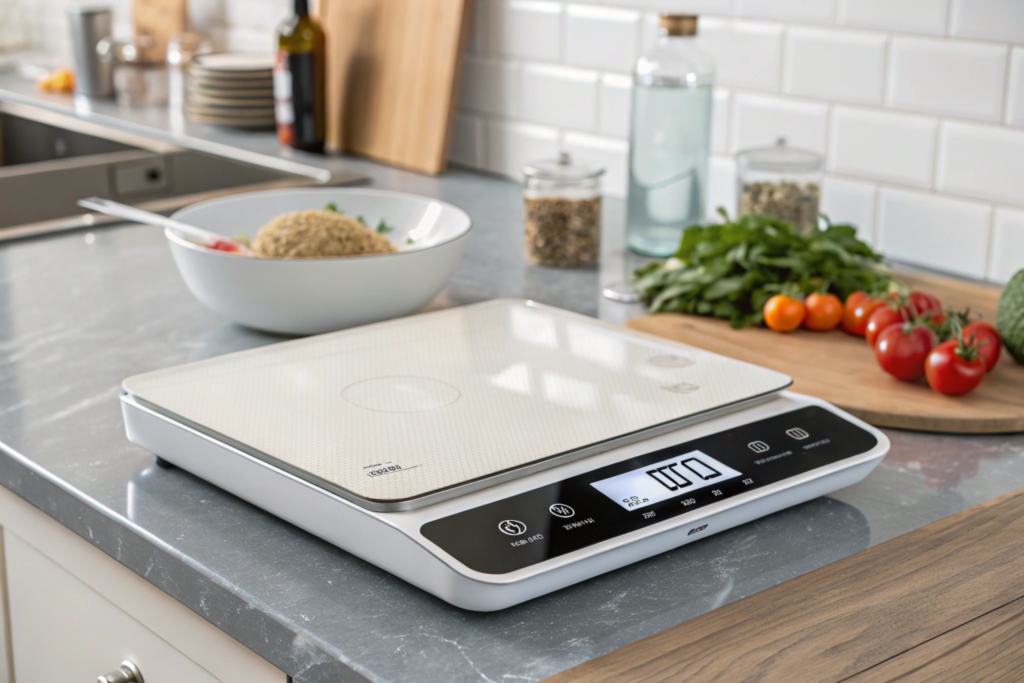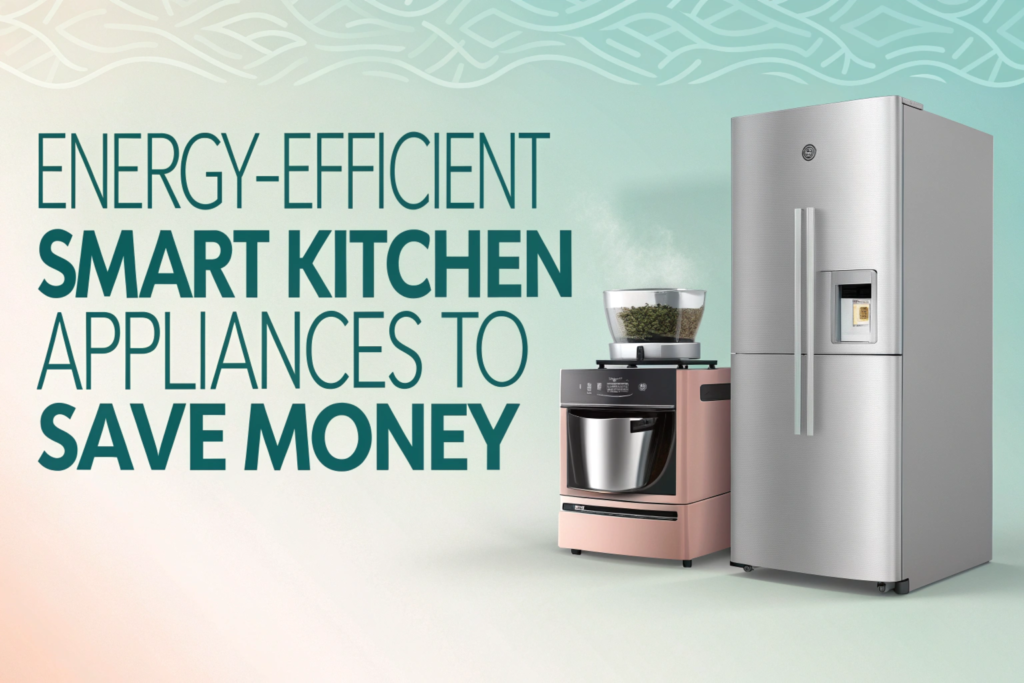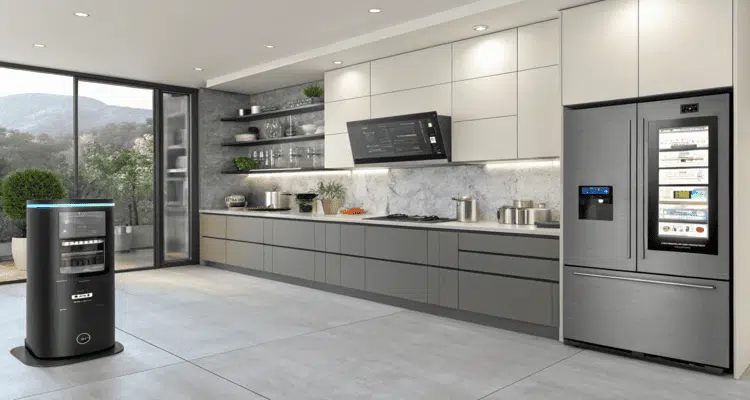In the modern world, technology has revolutionized every aspect of our lives, including the way we cook and manage our kitchens. The concept of a smart kitchen is one of the most exciting developments in the realm of smart homes. But what exactly is a smart kitchen? In this comprehensive guide, we explore what makes a kitchen “smart,” the technologies involved, the benefits, and how to create one in your own home.
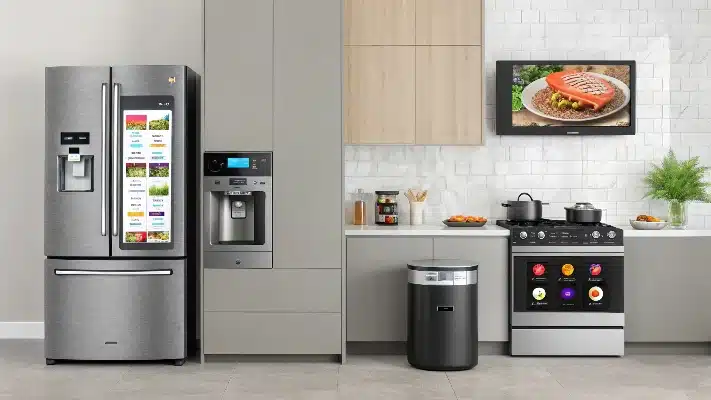
What is a Smart Kitchen?
A smart kitchen is a technologically advanced cooking space designed to make cooking, cleaning, and managing your kitchen more efficient, convenient, and enjoyable. It integrates smart appliances, IoT (Internet of Things) devices, and automation to provide a seamless cooking and kitchen management experience. From smart refrigerators that notify you when you’re running low on groceries to voice-controlled ovens, a smart kitchen combines innovation and functionality.
Key Features of a Smart Kitchen
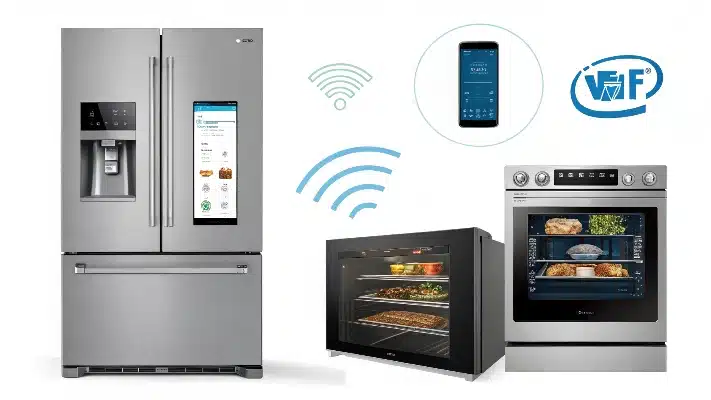
Smart Appliances
Smart appliances form the backbone of any smart kitchen. These devices are equipped with Wi-Fi connectivity, sensors, and advanced software that allow users to control them remotely via smartphone apps or voice assistants. Examples include:
- Smart Refrigerators: These can track inventory, suggest recipes based on available ingredients, and even let you view the inside of your fridge from your phone.
- Smart Ovens: Equipped with precise temperature controls and remote monitoring, these ovens ensure perfect cooking results every time.
- Smart Dishwashers: With features like load sensors and energy-efficient cycles, these dishwashers save time and resources.
- Smart Coffee Makers: Program your coffee to be ready when you wake up or adjust brewing settings remotely.
Voice-Control Integration
Voice assistants like Amazon Alexa, Google Assistant, or Apple’s Siri play a crucial role in smart kitchens. They allow users to control appliances, set timers, create shopping lists, and find recipes using simple voice commands.
IoT Connectivity
The Internet of Things enables all smart devices in the kitchen to communicate with each other. For example, your smart refrigerator can sync with your oven to recommend recipes and adjust cooking times based on the ingredients you have.
Energy Efficiency
Smart kitchens are designed with sustainability in mind. Energy-efficient appliances and real-time usage tracking help homeowners reduce their carbon footprint and lower utility bills.
Automated Cooking Assistance
Smart kitchens often include automated cooking systems that simplify meal preparation. From robotic arms that cook meals to smart pans that monitor cooking temperatures, these innovations take the guesswork out of cooking.
Benefits of a Smart Kitchen

Enhanced Convenience
With features like voice control and remote monitoring, smart kitchens make daily tasks more convenient. Imagine preheating your oven on your way home or asking your voice assistant to reorder pantry staples.
Improved Efficiency
Smart appliances optimize energy usage, saving both time and money. For instance, smart dishwashers adjust water usage based on load size, and smart ovens cook food faster using precise temperature controls.
Health and Wellness Support
Smart kitchens can promote healthier eating habits. Smart refrigerators track expiration dates and suggest nutritious recipes, while smart scales and apps help with portion control and calorie tracking.
Increased Home Value
A well-designed smart kitchen is an attractive feature for homebuyers. Installing smart technology in your kitchen can significantly boost your property’s market value.
Customization and Personalization
Smart kitchens allow for a personalized cooking experience. From setting preferred coffee brewing temperatures to automating cooking routines, everything can be tailored to suit individual preferences.
How to Create Your Own Smart Kitchen

Start with the Basics
Begin by integrating a few smart devices into your kitchen. A smart speaker, a smart plug, or a Wi-Fi-enabled coffee maker are great starting points.
Upgrade Your Appliances
Invest in smart versions of essential appliances like refrigerators, ovens, and dishwashers. Look for devices that are compatible with your existing smart home ecosystem.
Optimize Connectivity
Ensure all your smart devices are connected to a reliable Wi-Fi network. Consider investing in a smart hub to control multiple devices from a single interface.
Leverage Smart Accessories
Small accessories like smart thermometers, kitchen scales, and even smart light bulbs can enhance the functionality of your kitchen without a major investment.
Embrace Automation
Set up routines and schedules for your smart devices. For example, program your coffee maker to brew coffee every morning at 7 AM or automate lighting to match your cooking schedule.
Read Also: What Are Smart Kitchen Appliances?
Popular Smart Kitchen Brands
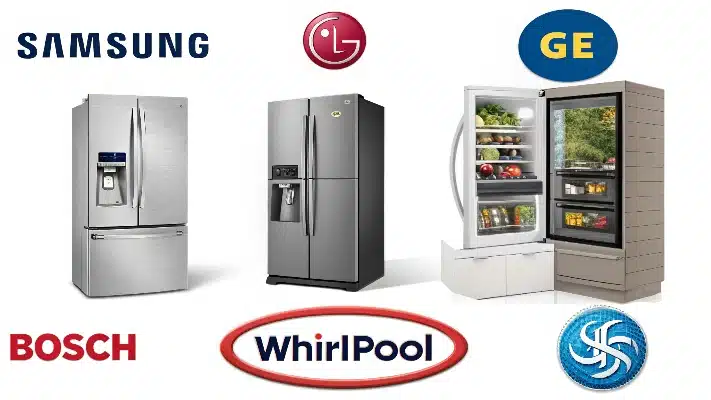
Some of the most popular brands in the smart kitchen market include:
- Samsung SmartThings: Known for its range of connected refrigerators and ovens.
- LG ThinQ: Offers innovative kitchen appliances with AI and IoT features.
- GE Appliances: Provides a wide selection of smart ovens, dishwashers, and refrigerators.
- Philips Hue: Perfect for creating ambient lighting in your smart kitchen.
- iRobot: Offers robotic vacuum cleaners to keep your kitchen floors spotless.
FAQs
Are smart kitchens expensive?
The cost of a smart kitchen varies depending on the number and type of smart devices you install. While the initial investment can be significant, the long-term savings and convenience often outweigh the costs.
Can I retrofit my existing kitchen to make it smart?
Yes, you can! Start by adding smart devices like plugs, light bulbs, and speakers. Over time, you can upgrade appliances to create a fully connected kitchen.
Do smart kitchens require professional installation?
Most smart devices are designed for easy installation and can be set up by homeowners. However, for more complex systems, such as smart ovens or integrated hubs, professional installation may be recommended.
Are smart kitchens secure?
As with any IoT device, security is a concern. Ensure your smart devices are connected to a secure network, use strong passwords, and keep your devices updated with the latest software.
Can smart kitchens save energy?
Yes, energy-efficient smart appliances and real-time tracking can help reduce energy consumption and lower utility bills.
Conclusion
A smart kitchen is more than just a collection of gadgets; it’s a futuristic approach to cooking, cleaning, and kitchen management. With the right combination of smart appliances, IoT connectivity, and automation, you can transform your kitchen into a space that is efficient, sustainable, and tailored to your lifestyle. Whether you’re just starting your smart kitchen journey or looking to upgrade your existing setup, the possibilities are endless.
Related Posts
- Smart Kitchen Automation Systems 2025
Welcome to the world of smart kitchen automation systems, where cutting-edge technology meets the heart…
- Smart Kitchen Appliances for Small Spaces 2025: Maximize Efficiency
In modern living, maximizing functionality in small spaces has become a priority. For those with…
- What Are Smart Kitchen Appliances? Comprehensive Guide 2025
Smart kitchen appliances are transforming the way we approach cooking and kitchen management, making tasks…










_ # **The Pros and Cons of Smart Appliances** Smart appliances are making waves in the tech world, and it’s no wonder—they promise convenience, efficiency, and even a bit of futuristic flair. But are they worth the hype? Whether you’re considering a smart fridge, a robotic vacuum, or a voice-controlled coffee maker, it’s crucial to weigh the benefits and drawbacks before jumping in. Let’s dive into the pros and cons of these high-tech household helpers. --- ### **Meta Title** Are Smart Appliances Worth It? Pros and Cons to Consider ### **Meta Description** Explore the pros and cons of smart appliances. Discover how they can simplify life, improve efficiency, and the potential challenges they bring. --- ## **Table of Contents** | **Sr#** | **Headings** | |---------|----------------------------------------| | 1 | **Introduction: What Are Smart Appliances?** | | 2 | **The Pros of Smart Appliances** | | 3 | **Energy Efficiency and Sustainability** | | 4 | **Convenience and Time-Saving Features** | | 5 | **Improved Home Safety** | | 6 | **Seamless Integration with Smart Ecosystems** | | 7 | **The Cons of Smart Appliances** | | 8 | **High Upfront Costs** | | 9 | **Potential Privacy and Security Concerns** | | 10 | **Maintenance and Software Updates** | | 11 | **Reliance on Internet Connectivity** | | 12 | **Are Smart Appliances Worth It?** | | 13 | **Tips for Choosing the Right Smart Appliance** | | 14 | **Future Trends in Smart Appliances** | | 15 | **Conclusion** | | 16 | **FAQs** | --- ## **1. Introduction: What Are Smart Appliances?** Smart appliances are the next generation of household devices equipped with internet connectivity and advanced features. They can be controlled remotely via apps, voice assistants like Alexa or Google Assistant, and even artificial intelligence. From refrigerators that can create shopping lists to ovens that suggest recipes, these devices are designed to make life easier. But with all their futuristic perks, are they always the right choice? Let’s explore both sides of the coin. --- ## **2. The Pros of Smart Appliances** When it comes to smart appliances, the benefits are plenty. Here are the major advantages: ### **3. Energy Efficiency and Sustainability** Did you know that smart appliances can help you save on energy bills? Many come with energy-efficient settings, learning algorithms, and the ability to operate during off-peak hours. For example, a smart thermostat can optimize your home’s heating and cooling, cutting down unnecessary energy use. By reducing waste and lowering consumption, smart appliances also support a more sustainable lifestyle. Who wouldn’t want to save money while helping the planet? --- ### **4. Convenience and Time-Saving Features** Life is busy, and every second counts. Smart appliances are here to give you some of that time back. Imagine preheating your oven on your way home or asking your smart fridge what’s inside without opening the door. These devices often learn your habits, making them even more helpful over time. For instance, a smart coffee maker can brew your favorite cup as soon as your alarm goes off. It’s like having a personal assistant in your home! --- ### **5. Improved Home Safety** Smart appliances can enhance home safety in ways you might not expect. Smart smoke detectors, for instance, can send alerts to your phone if there’s a fire, even when you’re not at home. Similarly, smart locks and cameras integrate seamlessly with other smart appliances, creating a comprehensive safety network. A smart oven can even turn itself off if left on for too long, reducing the risk of accidents. --- ### **6. Seamless Integration with Smart Ecosystems** If you’re already using smart devices, adding smart appliances to your home can elevate the experience. Many smart appliances sync with voice assistants or home hubs, enabling you to control them with a single command. Picture this: You say, “Goodnight,” and your home locks the doors, dims the lights, adjusts the thermostat, and powers down unnecessary appliances. That’s the magic of integration. --- ## **7. The Cons of Smart Appliances** As amazing as smart appliances are, they’re not without their downsides. Let’s take a closer look at the potential challenges. ### **8. High Upfront Costs** One of the biggest hurdles is the price tag. Smart appliances can cost significantly more than their traditional counterparts. While they often save money in the long run, the initial investment can be daunting. For example, a regular microwave might cost $100, but a smart microwave could set you back $300 or more. Is the added convenience worth the price? That depends on your priorities. --- ### **9. Potential Privacy and Security Concerns** With great technology comes great responsibility—and risks. Smart appliances collect data to function efficiently, but this can raise privacy concerns. There’s always the possibility of hacking or unauthorized access to your devices. Imagine someone gaining control of your smart lock or accessing personal data stored in your devices. Ensuring robust security settings is a must. --- ### **10. Maintenance and Software Updates** Smart appliances run on software, which means they require regular updates to stay functional and secure. However, not all manufacturers provide long-term support, leaving your devices vulnerable to bugs and glitches. Moreover, software issues can render your appliance temporarily useless, adding an extra layer of frustration to everyday life. --- ### **11. Reliance on Internet Connectivity** Smart appliances thrive on internet connections. If your Wi-Fi goes down, so do many of your appliances’ advanced features. While most devices have basic offline functionality, you lose the “smart” aspect without connectivity. This can be a dealbreaker for some users, especially in areas with unstable internet. --- ## **12. Are Smart Appliances Worth It?** The answer depends on your needs, budget, and lifestyle. If you value convenience, energy efficiency, and integration, they might be a game-changer for you. However, if you’re concerned about costs or security, you may want to stick with traditional options—or do a mix of both. --- ## **13. Tips for Choosing the Right Smart Appliance** 1. **Define Your Needs:** Focus on appliances that solve specific pain points in your home. 2. **Set a Budget:** Determine how much you’re willing to spend and prioritize accordingly. 3. **Check Compatibility:** Ensure the device integrates with your existing smart ecosystem. 4. **Read Reviews:** Look for real user experiences to gauge reliability. 5. **Verify Security Features:** Opt for appliances with robust privacy settings. --- ## **14. Future Trends in Smart Appliances** The future looks bright for smart appliances. Expect innovations like self-repairing devices, deeper AI integration, and even more sustainable options. As technology evolves, so will the capabilities of these gadgets, making them even more indispensable. --- ## **15. Conclusion** Smart appliances are transforming how we live, offering incredible benefits alongside some notable challenges. By understanding their pros and cons, you can make informed decisions that align with your lifestyle. --- ## **16. FAQs** **1. What are some examples of smart appliances?** Smart refrigerators, ovens, dishwashers, robotic vacuums, and thermostats are popular examples. **2. Do smart appliances save money?** Yes, many smart appliances save energy, which can lower utility bills over time. **3. Are smart appliances safe?** While generally safe, users should ensure secure passwords and regular software updates to minimize risks. **4. Can smart appliances work without Wi-Fi?** Some features may work offline, but many advanced functionalities require internet connectivity. **5. Are smart appliances worth the investment?** It depends on your lifestyle and needs. They’re ideal for tech-savvy users seeking convenience and efficiency.](https://kitchengadgetsinsider.com/wp-content/uploads/2024/11/what-are-the-pros-and-cons-of-smart-appliances-1024x683.png)
